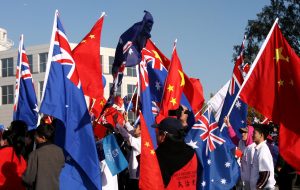Relations between Beijing and Canberra have continued to fray in 2021. This week, China arrested Cheng Lei, an Australian citizen and news anchor for Chinese state broadcaster CGTN, on suspicion of illegally leaking state secrets overseas. Cheng had been detained in China in August 2020, but the formal arrest by Chinese authorities indicates that an official investigation into her conduct will follow. Consular officials have regularly visited Cheng since her detention this past summer.
In light of the arrest, Australia voiced concern for Cheng. “We continue to seek assurances of her being treated appropriately, humanely and in accordance with international standards, and that will continue to be the case,” said Australian Foreign Minister Marise Payne.
Chinese authorities bristled in response, calling on Australia to refrain from any meddling in its case. “China is a country governed by law. China’s judicial authorities have been dealing with cases independently and the rights of the person involved are fully protected,” Chinese Foreign Ministry spokesperson Wang Wenbin said. “We hope the Australian side will respect China’s judicial sovereignty and stop interfering in China’s handling of cases in accordance with law in any form.”
Last year, two Australian foreign correspondents were flown out of China after being questioned by the country’s Ministry of State Security after Cheng was detained. And Cheng is not the first Australian to be held on such grounds. Australian writer Yang Hengjun, first detained at the Guangzhou airport in January 2019, was formally charged with espionage in October 2020.
These recent events between Beijing and Canberra are just the latest in a series of developments that have come to mark the lowest point in bilateral ties in decades. The precipitous decline has been tied to the Australian government’s backing of an international inquiry into the origins of COVID-19 in April 2020.
Australian politicians have condemned Beijing’s stance vis-a-vis Hong Kong and its new national security legislation, warned against aggression toward Taiwan, and called for a boycott of the Beijing 2022 Winter Olympics. Legislators are reviewing the Customs Amendment (Banning Goods Produced By Uyghur Forced Labor) Bill 2020, a bill that would ban the importation of goods from Xinjiang and other parts of China produced using forced labor. These positions reflect a shift in Australia’s willingness to speak out on human rights and politically sensitive issues for China.
Unsurprisingly, Beijing is not backing down. In November, a leaked document from Chinese authorities to Australia outlined 14 grievances, rebuking the Australian government’s toughening stance on China. Among the grievances were accusations of “incessant wanton interference” in Hong Kong, Taiwan, and Xinjiang, “spearheading the crusade against China” in multilateral fora, attempts to “torpedo” the Belt and Road Initiative, backing anti-China think tanks, and unfriendly and antagonistic media reports about China.
In the past year, these political tensions have spilled over into the economic dimension of the bilateral relationship. Beijing hit back against Canberra with a slew of restrictions and tariffs targeting Australian exports of barley, coal, cotton, lobster, meat, timber, and wine. In kind, Canberra also imposed tariffs on Chinese aluminum, paper, and steel.
At the close of 2020, Australia filed a complaint against China for its duty measures against barley at the World Trade Organization. This move is notable as Australia’s pursuit of consultations with China was lodged at the WTO and not via remedies available through the China-Australia Free Trade Agreement, which entered into force in 2015. If the consultation process fails to produce a resolution on barley, a multilateral panel would be established to issue a ruling.
And yet, while Beijing’s pressure and bans on specific Australian sectors have raised red flags about the potential for greater economic coercion, trade in the most lucrative commodities for the two partners – iron ore and natural gas – appears to be holding steady. Although government figures suggest that the combined impact of Chinese trade measures has not hurt the Australian economy overall, the importance of two-way trade for Australia’s future growth is undeniable.
The economic dimension of the Australia-China relationship looms large as the trajectory of ties continues to deteriorate. China is by far Australia’s most important trading partner, the destination for nearly 40 percent of the country’s exported goods and more than 17 percent of service exports from 2019 to 2020, according to research firm Capital Economics. “This economic integration is so complex that, regardless of the country’s own political cycles, Australia’s growth and resilience relies upon its understanding of Beijing’s planned economy,” Katie Howe, a Canberra-based strategic consultant, wrote in The Diplomat.
For now, the economic complementarity between China and Australia and Beijing’s self interest in recovery have prevented diplomatic tension from giving way to greater economic erosion. Still, it is unclear how long the two sides will weather the deepening chasm, which apparently has yet to hit bottom in 2021.

































